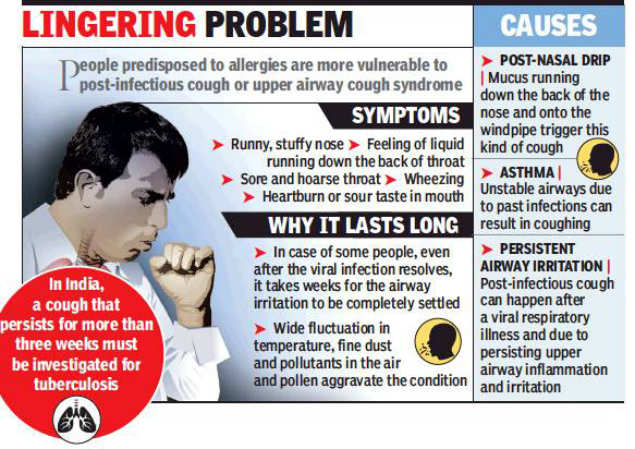For people with chronic cough over 8 weeks duration. One type of postinfectious cough that is particularly virulent is that caused by B pertussis infection.
 Dust Pollutants In Air Pollens Aggravate Persistent Cough Following Viral Infection Pune News Times Of India
Dust Pollutants In Air Pollens Aggravate Persistent Cough Following Viral Infection Pune News Times Of India
Chronic cough is most commonly caused by smoking use of angiotensin-converting enzyme ACE inhibitors upper airway cough syndrome previously called post-nasal drip asthma gastro-oesophageal reflux disease or eosinophilic bronchitis.

Post viral cough. In some cases the nose itself is to blame rhinitis but in others a prolonged postnasal drip lingers after a viral upper respiratory infection. In typical cases patients with postnasal drip cough more at night and they are often aware of a tickling feeling at the back of their throats. Such patients are considered to have a subacute cough because the condition lasts for no 8 weeks.
When the cough is accompanied by paroxysms of coughing posttussive vomiting andor an inspiratory whooping sound the diagnosis of a B pertussis infection should be made unless another diagnosis is proven. These coughs typically clear. Cough can persist for weeks or months after SARS-CoV-2 infection often accompanied by chronic fatigue cognitive impairment dyspnoea or paina collection of long-term effects referred to as the post-COVID syndrome or long COVID.
Squeeze half a lemon into a mug of boiled water. Add 1 to 2 teaspoons of honey. Some call this variety a post-infectious cough.
This postviral - inflammatory response may include bronchial hyperresponsiveness mucus - hypersecretion and impaired mucociliary clearance. The etiology of the post-infectious cough is thought to be an inflammatory response triggered by the original viral upper respiratory infection. How are you feeling.
This is suggested by persistent dry cough that started with an obvious respiratory tract infection and the person is systemically well with a normal respiratory examination. Post viral cough is traditionally said to last for 6-8 weeks but you need to consider the usual causes of cough GORD post nasal drip or asthma exacerbated by the infection look for PEFR variability on a home diary. Postinfectious cough - is a self-.
Take small sips of fluids instead of taking large sips to facilitate swallowing. As well as the physical symptoms listed above it is very common to. Stay hydrated by drinking plenty of water lukewarm preferably.
A post-viral cough is one that lingers after a person has recovered from a viral infection. Though the cough may persist for up to four weeks you generally start to feel better as the days go by. Cough is one of the most common presenting symptoms of COVID-19 along with fever and loss of taste and smell.
Post viral cough Difficulties with memoryconfusion This might make it more difficult to do the things you are normally able to do such as housework having a wash getting dressed or walking up and down the stairs. A dry cough is likely to put greater strain on your throat. Patients who complain of a persistent cough lasting 3 weeks after experiencing the acute symptoms of an upper respiratory tract infection may have a postinfectious cough.
According to the UKs National Health Service the following strategies can be used to manage a dry cough. A viral infection of the upper respiratory system in other words a common cold often causes nasal symptoms such as a stuffy nose and sneezing which clear up after a few days. Post-infectious cough for example after infections with Mycoplasma pneumonia or Bordetella pertussis.
It may last 38 weeks. Drink while still warm do not give hot drinks to small children. Other causes of cough include.
